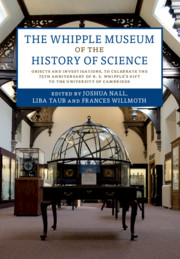Contents
2What Were Portable Astronomical Instruments Used for in Late-Medieval England, and How Much Were They Actually Carried Around?
3‘Sundials and Other Cosmographical Instruments’: Historical Categories and Historians’ Categories in the Study of Mathematical Instruments and Disciplines
4‘That Incomparable Instrument Maker’: The Reputation of Henry Sutton
6Ideas Embodied in Metal: Babbage’s Engines Dismembered and Remembered
8Buying Antique Scientific Instruments at the Turn of the Twentieth Century: A Data-Driven Analysis of Lewis Evans’s and Robert Stewart Whipple’s Collecting Habits
9Like a Bos: The Discovery of Fake Antique Scientific Instruments at the Whipple Museum
11What ‘Consul, the Educated Monkey’ Can Teach Us about Early Twentieth-Century Mathematics, Learning, and Vaudeville
12Robin Hill’s Cloud Camera: Meteorological Communication, Cloud Classification
13Chicken Heads and Punnett Squares: Reginald Punnett and the Role of Visualisations in Early Genetics Research at Cambridge, 1900–1930
14Stacks, ‘Pacs’, and User Hacks: A Handheld History of Personal Computing
Appendix:Student Research Conducted on the Whipple Museum’s Collections since 1995

